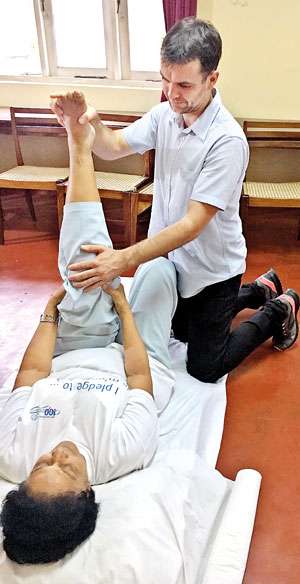19 Oct 2018 - {{hitsCtrl.values.hits}}
What is podiatry?Podiatry is a branch of medicine which includes the study, diagnosis and medical and surgical treatment of disorders of the foot, ankle and lower extremity. Podiatrists treat a wide variety of foot and lower extremity conditions, through nonsurgical and surgical approaches. The American Board of Podiatric Orthopaedics and Primary Podiatric Medicine (ABPOPPM) offers a comprehensive board qualification and certification process in podiatric medicine and orthopedics. Podiatric Medicine and Orthopaedics is the medical specialty concerned with the comprehensive and continuous foot health care for patients. |
 The feet and legs are as important as every other part of our body. But do we take enough care of our feet? In most instances our feet are neglected to the point that as we age we become less stable and the legs become weak. This is why regular exercises and exercises especially aimed at the feet, ankles and the lower feet are important.
The feet and legs are as important as every other part of our body. But do we take enough care of our feet? In most instances our feet are neglected to the point that as we age we become less stable and the legs become weak. This is why regular exercises and exercises especially aimed at the feet, ankles and the lower feet are important.
In an attempt to spread awareness on podiatry, Singapore-based Senior Podiatrist Timothy Maiden recently visited Sri Lanka upon an invitation by the Sri Lanka Girl Guides Association (SLGGA). Tim is currently employed at The Foot Practice and is a visiting podiatrist at the Haoma Medical Clinic Singapore. During his brief visit to Sri Lanka, Tim checked over 65 patients with various ailments relating to the lower foot.
Foot and Ankle Conditions treated in Podiatry
|
Knee pain, heel pain and bunions are common in Sri Lanka .
“I came across knee pains, heel pains and bunions,” Tim said in an interview with Health Capsule. “The symptoms were presented in a very similar manner and included loss of strength, tissues, instability issues in the ankles, weakness in the legs and instability in the foot which put more stress on the joints. I have mostly checked the conditions of women since we work with the SLGGA. We have seen children below ages five or six and elderly women in their 80s and 90s,” he observed.

Through podiatry, Tim plans to introduce a fun way of improving the symptoms and to show them that by doing exercises they can see improvements regarding those ailments. “Lifestyle could be one of the reasons why they are experiencing these conditions. But it is multifactorial. A surgery will bring about a short-term remedy. But even after a surgery if your body is stronger, the recovery will be much quicker. So we are trying to analyse their ailments and give them exercises to do. We check the places where they have the weakness – whether it is from the calf, the thigh etc. and then we move into stretching, strengthening and other mobilizing techniques,” he added.
Maiden has worked in India, China and Singapore and currently he is involved in training athletes, cricketers and other sportsmen at two sports clinics. There the approach is slightly different where they have introduced running analysis on treadmills and other activities.
“Whenever there is an ailment, read-up on it,” he advised. “Walking makes one fitter, but not stronger. So patients need to focus on strengthening the leg muscles; 25% of the bones in your feet carry your body weight. If we continue to strengthen the legs we put less stress on the feet – if you strengthen the feet the stability increases. So it’s about strengthening, stretching and flexing. Therefore it is important to seek a second opinion before going in for a surgery,” he said.
22 Dec 2024 3 hours ago
22 Dec 2024 3 hours ago
22 Dec 2024 6 hours ago
22 Dec 2024 6 hours ago
22 Dec 2024 6 hours ago